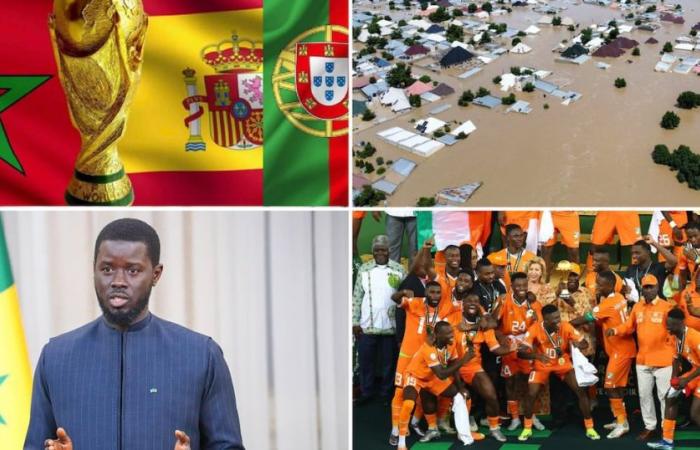It is obviously difficult to list the significant events of a year on the scale of a country and even more so those of an entire continent. But there are events like no other such as the miraculous victory of the Ivorians at CAN 2023 at home, the presidential elections with some democratic alternations, the increase in natural disasters, the deaths of personalities…
Miraculous Elephants at CAN 2024
The first major event of 2024 at the continental level was certainly the African Cup of Nations. A competition bringing together 24 nations which took place in Ivory Coast. This 34th edition, played from January 13 to February 11, 2024, was won by Côte d’Ivoire, a miraculous team, against the Nigerian team.
This victory is considered a miracle knowing that the Ivorian team was almost eliminated from the competition. Third in its group, it took a victory for Morocco over Zambia for the country to reach the round of 16 at the last minute with only 3 points in 3 games and especially after having suffered a defeat against Equatorial Guinea (0-4) . Morocco’s victory against Zambia was worthily celebrated by the Ivorian supporters who miraculously returned to the race.
Read also: CAN 2023: Ivorians overjoyed after the consecration of the Elephants
After this miracle, the Ivorians parted ways with their French coach Jean-Louis Gasset and after an unsuccessful attempt to hire Hervé Renard, they opted for a local coach, Emerse Foé on an interim basis. And finally it was he who led the Elephants to the final coronation after beating Senegal, the reigning champion, in the round of 16, marking their rebirth, before beating Mali in the quarter-final, the DRC in the semi-final and, finally win the title of African Champion by beating Nigeria in the final in a fiercely contested match.
Between drought and flood, Africa suffers
Africa, a low emitter of greenhouse gases, is among the continents most vulnerable to climate change. Never has the African continent experienced such a succession of natural disasters, as was the case in 2024. Cyclones, floods, droughts, torrential rains… have punctuated the daily life of many African countries during the year which is ending, exacerbated by the El Nino phenomenon which gives them an extreme dimension. Africa has been hit by numerous hurricanes and cyclones: Belal (Mauritius), Gamane (Madagascar), Hidaya (Kenya and Tanzania),
The list of countries affected by floods is very long: DRC, Niger, Mali, Kenya, Tanzania, Nigeria, Sudan, Chad, Cameroon… And while certain regions face excess rainwater, others are experiencing their worst year of drought. This is the case for many countries in southern Africa including Zambia and Malawi.
Read also: Natural disasters: three African countries appear in the world’s Top 10 nations having suffered particularly high losses
These natural disasters caused extensive human and material damage. According to the International Organization (IOM), in West and Central Africa, torrential rains have caused more than 1,500 deaths. As for the material damage, it is colossal with destruction of infrastructure, habitats, crops and livestock… In Chad, the floods affected a million people, led to 145 deaths, the destruction of 70,000 houses and the loss of 30,000 heads of cattle. More than 250,000 hectares of agricultural land were flooded, as many crops destroyed.
Presidential elections in spades, democratic change in difficulty
In total, 14 countries were affected by these electoral contests, including presidential elections by direct and indirect suffrage (Ethiopia and Mauritius). These are Chad, Rwanda, Algeria, Tunisia, Mozambique, Ghana, South Africa, Mauritania, Comoros, Ethiopia, Senegal, Mauritius, of Namibia and Botswana. These consultations concerned countries with around 25% of the population of the African continent.
Overall, the presidents who stood for re-election were reappointed with Soviet-style scores and sometimes through clumsily manipulated figures, as was the case in Algeria. President Abdelmadjid Tebboune was re-elected with 84.30% of the votes, according to the Constitutional Court, while the Electoral Authority had credited him with 94.65%. Unprecedentedly, the three presidential candidates had issued a joint press release to contest “the vagueness and contradictions in the figures on participation» and “errors» on the percentages of votes.
Read also: Elections in Botswana: the president admits defeat
There are still some exceptions in Botswana and Mauritius where the outgoing presidents were defeated by their opponents. In Senegal and Ghana, countries in which outgoing heads of state could not stand for re-election due to the limitation of mandates to two consecutive terms, it was opponents who won the elections. Thus, in a context of democratic decline in West Africa, Senegal and Ghana are asserting themselves as models of stable and dynamic democracy, like Cape Verde and Benin.
Four democratic alternations were recorded out of a total of 14 presidential elections in 2024: Senegal, Botswana, Mauritius and Ghana. The case of Senegal is emblematic. President-elect Bassirou Diomaye Faye left prison to find himself elected President of the Republic ten days later after beating the representative of the ruling party, Amadou Ba, by obtaining 54.28% of the votes in the first round. The youngest president of Senegal since independence at 44, he committed to radical change with the political and governance practices of the past with the Wolof triptych “Jub”, “jubbal”, “jubbanti” which translates as “righteousness”, “transparency” and “exemplarity”.
The Ivory Coast Elephants miraculously won CAN 2023 after escaping elimination in the first round. DR
Finally, it should also be noted that Namibia has chosen for the first time to elect a woman as head of the country in the person of Netumbo Nandi_Ndaitwah. She was the vice president and from the ruling party. She won the election in the first round with 57.31% of the votes cast.
The 2030 World Cup in Morocco, with Spain and Portugal
The Kingdom of Morocco, leader in the organization of African Football, will co-organize, with Spain and Portugal, the 2030 World Cup which will mark the centenary of the competition. So decided the FIFA Council on Wednesday December 11, 2024 unanimously. The 211 member federations of FIFA voted for this joint candidacy by acclamation.
Morocco will thus be the second African country to host this competition, after South Africa in 2010. This edition will be played for the first time on three continents: Morocco (Africa), Spain and Portugal (Europe), but the three first matches of the first will take place in South America knowing that Argentina, Chile, Paraguay and Uruguay had submitted a joint application to host the centenary of the World Cup, the first edition having taken place in 1930 in Uruguay.
Read also: Morocco’s preparations for the 2030 World Cup: the ADB wants to submit a financing project of 650 million euros
Morocco thus obtains the co-organization of the 2030 World Cup after having applied five times: 1994, 1998, 2006, 2010 and 2026. For this second edition with 48 qualified nations, after that of 2026 in the United States, the Morocco has already selected the six cities to host the competition: Casablanca, Rabat, Marrakech, Fez, Agadir and Tangier.
These personalities who left us in 2024
– Amadou Mokhtar Mbow from Senegal, died on the night of September 23 to 24 in Dakar at the age of 103. The Senegalese intellectual headed UNESCO for 13 years (1974-1987). Teacher, several times minister under the regime of the first president of Senegal Léopold Sédar Senghor, the former secretary general of UNESCO was a great defender of multipartyism.
– Issa Hayatou, from Cameroon, died on August 8, 2024. His name is closely linked to African football, of which he led the Confederation of Football (CAF) from 1988 to 2017. He also served as interim president of the international federation of amateur football (FIFA) between 2015-2016, during the suspension of Sepp Blater for corruption.
– Touamni Diabaté, from Mali, died on July 19, 2024 at the age of 58. Nicknamed the “roi of the Kora“, is considered the master of the Kora, a traditional 21-stringed musical instrument. Toumani comes from a family of griots, guardians of traditions and keepers of the historical stories of West Africa.
– Hage Geingob, President of Namibia, died on February 4, 2024. He is one of the most notable political figures in the history of Namibia who fought for the independence of Namibia and against the regime of ‘apartheid. He served as Prime Minister for a long time before becoming President of Namibia. He died at the age of 82.
Read also: Death of Issa Hayatou: in Cameroon, it is a tribute to the man of “incomparable humility”
Among those who left us in 2024 are also Hama Amadvou, one of the dinosaurs of Niger’s politics, nicknamed “theand phoenix» died at the age of 74, the South African writer and emblematic figure of the fight against apartheid Breyten Breytenbah, the star actor of Nollywood (Nigerian cinema), John Okafor, alias Mr Ibu, died on 2 March 2024, Dikembe Mutombo, Congolese basketball player and member of the NBA temple who died on September 30 at the age of 58, ….






